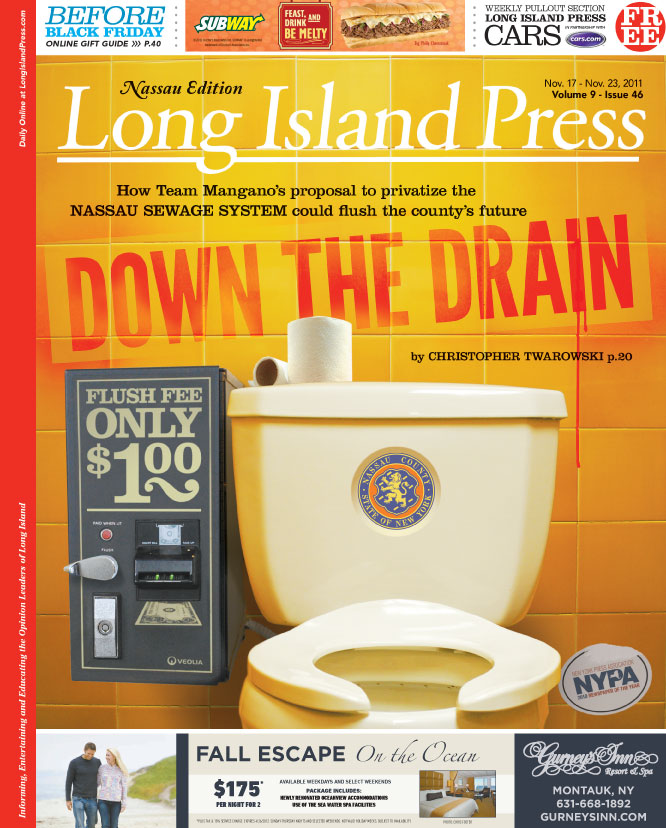

Civil Services Employees Association Nassau Local 830, Jerry Laricchiuta at NUMC on Wednesday.
Anti-drug abuse advocates and union officials are decrying a proposal Nassau University Medical Center board members are reportedly considering to downsize or eliminate hospital’s inpatient detox unit.
NUMC board members said Wednesday they are “evaluating all options” concerning its inpatient unit, which includes 20 detox beds. Critics argued there is already a shortage of inpatient detox beds amid the prescription drug and heroin abuse epidemic that has gripped Long Island.
The issue “has not yet come to the full board, we are in the process of discussing various options at this point in time,” said NUMC chairman Craig Vincent Rizzo. “Nothing has been voted upon, nothing has even been presented to the full board as of this time.”
Substance abuse experts are worried about the negative effects a switch from inpatient to outpatient care at NUMC will have on those seeking help.
RELATED STORIES:
SCHUMER CALLS FOR TOUGHER SECURITY AT DRUG STORES
BELLONE, SUFFOLK COPS OUTLINE PHARMACY SAFETY PLAN
NASSAU TO HOST PHARMACY SECURITY SUMMIT
“You’re giving them a drug and your sending them home, so now you have another risk factor that they could then use a drug in addition to the drug you’ve given them so there’s no ability to monitor the safety on an outpatient basis,” Patricia Hacken, director of alcohol and substance abuse services at Long Beach Medical Center, told the Press.
NUMC president and CEO Arthur Gianelli released a statement saying the hospital is looking at several proposals related to detoxification, but did not elaborate.
“There is no scholarly evidence to support the claim that inpatient addiction services are superior to outpatient services, and any reduction in inpatient addiction beds would be more than offset by a massive expansion of outpatient addiction, primary care, and care management services,” he said.
While NUMC may be considering downsizing the unit, Long Beach Medical Center applied to double its detox beds from eight to 16 because of a “significant increase,” in requests for inpatient care, Hacken said.
NUMC and Long Beach Medical Center are the only two hospitals in Nassau County that currently provide inpatient care to those suffering from drug and alcohol abuse.
“I don’t believe they can do it with less beds,” Claudia Ragni, executive director of the Kenneth Peters Center for Recovery, said after pleading with board members to continuing inpatient detox at NUMC. “I think a better level of care can be created by extending the course of treatment.”
Ragni, who has been in the field for 30 years, said she was “beside herself,” when she saw news reports that NUMC might downsize inpatient care. “We’re going to see more deaths,” she said.
Jerry Laricchiuta, president of Civil Service Employees Association, Nassau Local 830, which represents approximately 3,400 employees at Nassau Health Care Corp. that runs NUMC, cited two deadly pharmacy robberies in a six-month span last year, including one in Seaford on New Year’s Eve.
“I am witnessing the dismantling of our only public hospital,” he said to board members, vowing to fight the proposed changes.
Jeffrey Reynolds, executive director of the Long Island Council on Alcoholism and Drug Dependence, said the lack of inpatient detox beds is an island-wide issue that forces some in recovery to seek treatment out of state.
“We’ve got nowhere to put people, it’s not entirely [NUMC’s] fault,” Reynolds said. “We’ve got nowhere to put people because there’s an opiate crisis and we haven’t built structures to effectively deal with this.”
Walerstein, of NUMC, said a more comprehensive program is needed to address the epidemic.
“Whether that requires less beds or more beds I don’t know the answer,” he said. “If I can be provided with data that shows that “X” model works, then we’re going to seriously look at that model. But to cast this to say that we made any decisions would be absolutely incorrect.”






